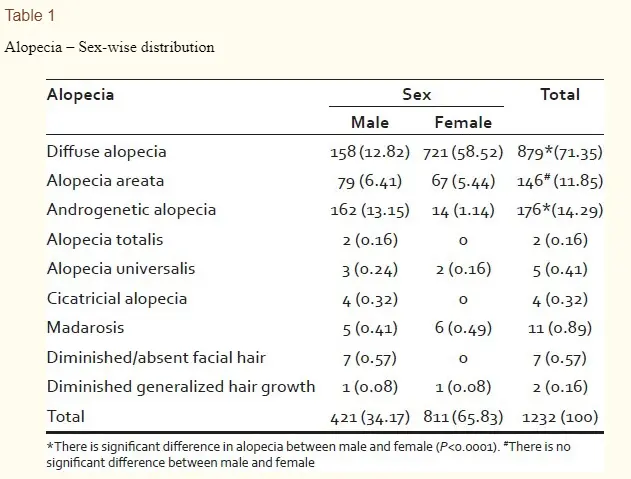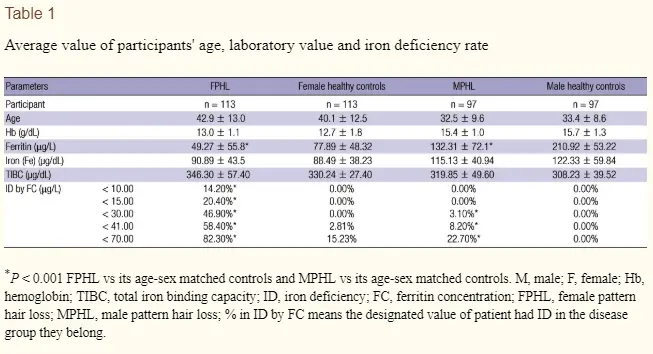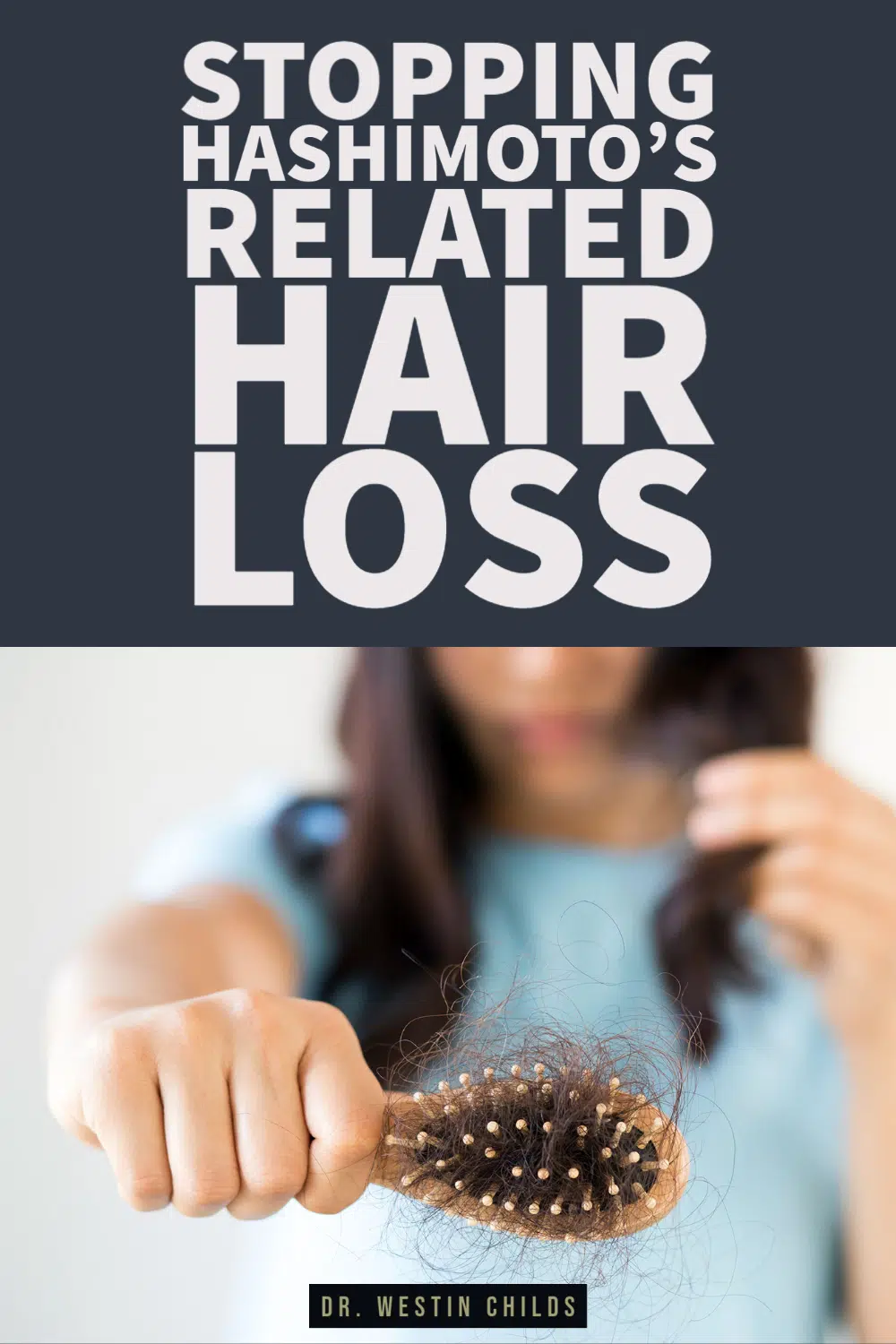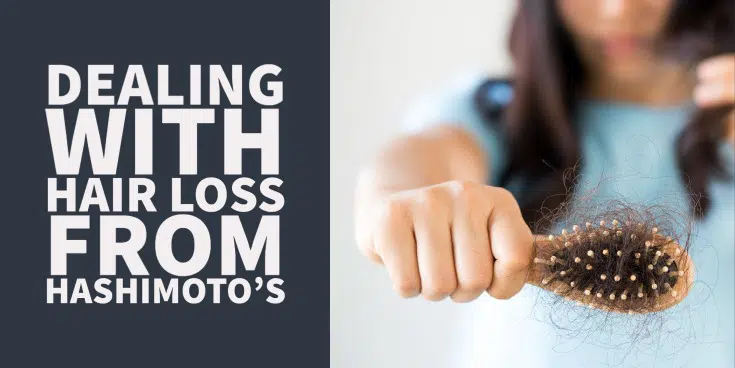A huge percentage of people with thyroiditis suffer from hair loss.
Is this something that you will just have to deal with for the rest of your life?
The answer is a resounding no.
In this article, we are going to explore exactly why thyroiditis leads to hair loss, what you can do about it, the complexity behind this issue, and some other important takeaways.
Hair loss from Hypothyroidism vs Hashimoto’s Thyroiditis
It’s important for you to understand, as the patient, that there are different types of thyroid diseases and that these different types of thyroid diseases cause different hair loss patterns.
In addition, the treatments for these conditions are also sometimes very different.
Just to illustrate this example, consider the difference between hyperthyroidism and hypothyroidism.
Hair loss in hyperthyroidism is typically treated by REDUCING thyroid hormone production by taking thyroid blocking medicines or by ablating your thyroid gland.
This results in DECREASED thyroid hormone and reduced stimulation on hair follicles and finally hair growth.
In hypothyroidism, on the other hand, hair loss primarily stems from decreased thyroid hormone stimulation on hair follicles (1).
This problem is treated by giving the patient MORE thyroid hormone in the form of thyroid medications (such as levothyroxine/Synthroid/NDT/etc.).
These medications INCREASE thyroid hormone and balance hair follicle stimulation and result in hair growth.
Okay, now that you understand this, we can talk a little bit about thyroiditis and how that differs from other thyroid diseases such as hypothyroidism.
Thyroiditis is a broad term used to define a state of inflammation targeted on the thyroid gland.
The term ‘-itis’ means inflammation and the term thyroid refers to your thyroid gland so if you put them together you get inflammation in the thyroid gland! Easy, right?
The only problem is that this inflammation can be caused by MANY different things.
Trauma, infections, autoimmune disease, and so on, can all trigger this inflammation.
Today we are going to focus primarily on Hashimoto’s thyroiditis which is a type of autoimmune thyroiditis sometimes referred to as AIT.
Why? Because Hashimoto’s thyroiditis is the MOST common type of thyroiditis and because most people (more than 80% (2)) with hypothyroidism actually have Hashimoto’s thyroiditis.
So as I refer to thyroiditis in this article just realize that I am referring to Hashimoto’s unless otherwise specified.
This distinction gets very important because the way that thyroiditis impacts your thyroid gland is much different than your run-of-the-mill hypothyroidism.
And the way that it influences your gland also influences your hair.
For instance:
Hashimoto’s thyroiditis can cause alternating states of both HYPOthyroidism and HYPERthyroidism, both of which cause hair loss in different ways.
The treatment for one will be different than the other.
But don’t let this confuse you, just realize that it’s an important element of hair loss in those with thyroiditis.
DOWNLOAD FREE RESOURCES
Foods to Avoid if you Have Thyroid Problems:
I’ve found that these 10 foods cause the most problems for thyroid patients. Learn which foods you should avoid if you have thyroid disease of any type.
The Complete List of Thyroid Lab tests:
The list includes optimal ranges, normal ranges, and the complete list of tests you need to diagnose and manage thyroid disease correctly!
The Complex Connection Between Hair Loss & Your Thyroid
No one should dispute the absolutely strong connection between thyroid conditions and hair loss.
And this connection extends to ALL types of thyroid diseases, not just thyroiditis which we will be focusing on today.
But the question is not does thyroid disease lead to hair loss, it’s how thyroid disease such as thyroiditis leads to hair loss.
And that question has a completely different answer.
In those with thyroiditis, especially autoimmune thyroiditis, hair loss tends to occur primarily because of inflammation and damage to the thyroid gland.
This results in decreased thyroid function and ultimately a state of hypothyroidism.
This is probably the most common cause of hair loss among those with thyroiditis and the data we have supports this (3):

This chart shows that among those with thyroiditis, about 71% of people complaining of hair loss suffer from diffuse hair loss (diffuse alopecia).
This diffuse hair loss is what is typically caused by low thyroid states because it affects all hair follicles equally.
But, that only accounts for about 70% of the total, which means about 3 out of 10 people with thyroiditis will have hair loss from OTHER causes.
The other causes of hair loss in thyroiditis include hair loss from other autoimmune conditions (alopecia areata (4)), from excess testosterone (androgenetic alopecia (5)), and hair loss of the eyelids/eyelashes (madarosis (6)).
People with thyroiditis can get hair loss from the thyroid disease directly but they can also get other types of hair loss.
And these types of hair loss are important because they account for about 3 out of 10 cases!
This list also doesn’t include hair loss from other variables such as specific thyroid medications (more on that below).
Can Hair Loss be Stopped?
I don’t want you to read this and start to get distraught or stressed out.
The good news is that you don’t necessarily have to suffer from hair loss forever if you have thyroiditis or Hashimoto’s thyroiditis.
While it can certainly be difficult to put your finger on the exact cause and type of hair loss you are suffering from, it is possible to stop that hair loss and even reverse it.

A big part of doing this, though, is ensuring that you have a physician who is properly trained and who understands the unique causes of hair loss in the thyroid population.
And this is why this information is so important.
The chances are actually fairly high that your doctor isn’t aware of these causes which means you will probably need to be an advocate for yourself.
What can you do?
With that in mind, let’s talk about some of the potential therapies which are available to you to stop your hair loss.
Some of these therapies do require physician assistance meaning you may need your doctor to prescribe you a medication or run certain tests.
So you may need your doctor on board for some of them.
But other therapies can be done at home and right away.
You don’t necessarily need a doctor to tell you to clean up your diet or to consider replacing certain nutrients with over-the-counter supplements.
If you are suffering from hair loss then these are your next steps:
#1. Ensure that you are taking enough thyroid medication.
As I stated previously, 70% of hair loss may be attributed directly to thyroid hormone status and whether or not that thyroid hormone is getting to your cells.
If you are someone taking medication who is STILL suffering from hair loss then this is the first place you want to look.
Ask yourself these questions:
- Are you taking thyroid medication but still suffering from the symptoms of hypothyroidism (fatigue, weight gain, hair loss, cold intolerance, etc.)?
- Do your thyroid lab tests suggest that your dose is optimal and not just normal?
- Did you notice an increase in hair fall when starting/adjusting your thyroid medication?
- Have you only tried T4 only thyroid medications such as levothyroxine or Synthroid?
If you answered yes to any of these questions then you may want to consider either adjusting your dose of thyroid medication or switching to a different type of thyroid medication as a trial.
What if you are someone who has thyroiditis but isn’t taking thyroid medication?
Don’t worry because this information still matters to you.
And if you fit into this category then you have two main options.
The first is to try and get your doctor to prescribe thyroid medication to treat the problem.
Many of you reading this may fall into the sub-clinical category whereby your thyroid lab tests are only slightly abnormal but not abnormal enough for your doctor to treat you (most doctors will only treat if the TSH is greater than 5.0).
There is good evidence to suggest that getting treatment, in this case, is actually a good idea so your efforts might be targeted at making a case for this treatment.
“Approximately 5% to 10% of hypothyroid patients complain about persistent symptoms, despite receiving LT4 treatment and having normal serum TSH levels [33]. Possible explanations of this finding include differences in individual sensitivity, combined autoimmune diseases or AITD on its own, and the inability of LT4 treatment to restore T4 and triiodothyronine (T3) concentrations to physiological levels in the serum and tissue.”
– Recent Advanced in Autoimmu7e Thyroid Disease (7)
The second is to try and naturally treat your thyroiditis.
Let’s say you aren’t a fan of using thyroid medication or maybe it’s not possible for you to obtain thyroid medication because your doctor isn’t willing to prescribe it.
Are you out of luck?
No, because there are things that you can do to naturally improve thyroid function in your body.
The degree of improvement you may or may not experience largely depends on your situation but I would never throw this option out.
There are many therapies available that can be used (many you can take advantage of right away) to treat thyroiditis.
Both of these scenarios result in the same thing.
Increased thyroid hormone in your body.
And that is the key.
Focus on getting MORE thyroid hormone into your cells and activating your hair follicles.
This activation will stimulate hair growth and even stop hair loss.
#2. Ensure that your thyroid medication is not contributing to your hair loss.
This gets into some murky water but it’s still something you should be aware of.
It’s possible that your thyroid medication is actually contributing to your hair loss.
Even though your thyroid medication is supposed to be helping grow your hair back it might actually be doing the opposite.
How is this possible?
Well, it turns out that one of the side effects of thyroid medication is hair loss/hair fall.
This side effect is separate from the potential positive effects that thyroid hormone has on your body.
And several types of thyroid medications are notorious for causing hair loss.
The problem is further complicated by the fact that hair loss/hair growth may be proportional to your dose.
So you might find yourself in a scenario where you need more medication to stop hair loss or you may need less medication (because you are taking too much) to promote hair growth.
Don’t worry too much about this, though, because most people will probably NOT experience this issue.
The good news is that most people (men and women) who start thyroid medication for hair loss in thyroiditis will see improvement relatively quickly.
#3. Reduce inflammation and autoimmune attack on your thyroid gland.
The goal here is to create an environment where your body can thrive.
Naturally treating your thyroid necessarily includes things such as improving your diet, eliminating foods that contribute to obesity and inflammation, reducing your stress, adding exercise to your daily routine, and so on.
All of these elements may not only improve your thyroid status but they can also improve your hair loss directly.
How?
Because you are addressing OTHER factors which also contribute to hair loss.
Factors such as a poor diet which is depleted in nutrients such as zinc and selenium, and high levels of stress which contribute to inflammation and directly to hair loss, will be ‘cleaned’ up as you clean up your lifestyle.
Furthermore, up to 12% of people with thyroiditis may suffer from a second autoimmune condition known as alopecia areata.
And there really aren’t any good medical (pharmaceutical medication) which target this issue.
But cleaning up your lifestyle may actually have a positive impact.
#4. Look at your ferritin.
Ferritin is often used as a marker for iron storage in your body.
Low ferritin is associated with low iron whereas high ferritin is associated with high iron levels.
Why are we talking about iron in an article focusing on hair loss in thyroiditis?
The answer is simple:
Iron (and thereby ferritin) are both incredibly important when it comes to hair growth.
It’s been suggested in some studies (8) that there is a minimal amount of ferritin in the serum required to ensure that your hair actually grows.

In addition, the iron found in pregnancy multivitamins is one of the main reasons that these vitamins are notorious for helping with hair growth.
It’s the iron found in these supplements!
Most multivitamins do not contain iron because taking too much can be harmful. But they ARE included in pregnancy multivitamins.
Iron is also helpful in helping to regulate thyroid function.
Low iron states can exacerbate or worsen existing states of hypothyroidism.
So you have at least two reasons to look at your ferritin and treat it if necessary.
#5. Don’t give up
Lastly, I want to point out that stopping your hair fall and improving hair growth can be a complicated problem.
For most of you, about 70%, you will probably be able to fix or reduce your hair loss in a matter of a few months.
But for the other 30% of you reading this, it may take much longer and the process may be more difficult.
If you fit into this latter category, don’t give up!
Stay with it, keep experimenting, keep looking at other options, and keep reading/researching.
To date, I have probably helped hundreds of people deal with hair loss in the setting of thyroid disease.
And I learn something new with each case that I deal with.
Conclusion
Hair loss in the setting of Hashimoto’s thyroiditis is not only common but can also be quite complex.
If you are suffering from hair loss be sure to take a holistic approach to your treatment.
That means looking at factors beyond just thyroid function and exploring things such as other autoimmune diseases, other hormone imbalances, and even nutrient deficiencies.
The truth is that all of these factors are probably playing some role in your current predicament.
But now I want to hear from you:
Do you have Hashimoto’s thyroiditis?
Are you also suffering from hair loss?
Have any therapies helped to either reduce your hair fall or help you grow back to your hair?
If so, which therapies helped? Which didn’t?
Leave your questions or comments below! It’s very important to keep the conversation going to that you can help others who are suffering or in your situation.











